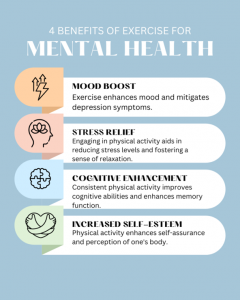The Impact of Exercise on Mental Health: Unveiling the Connection
by: Ondrej Blaha
In today’s fast-paced world, maintaining good mental health is paramount. Among the various strategies available, exercise stands out as a powerful tool. Research continues to shed light on the profound impact exercise has on mental well-being, revealing notable differences between individuals who exercise regularly and those who do not.
Understanding the Exercise-Mental Health Link
Numerous studies have investigated the relationship between exercise and mental health, consistently showing a positive correlation. Anderson and Shivakumar (2013) highlight that exercise triggers the release of endorphins, the body’s natural mood elevators, leading to feelings of euphoria commonly known as the “runner’s high.” Additionally, regular exercise improves sleep patterns, cognitive function, and self-esteem, while reducing symptoms of anxiety, depression, and stress.
Contrasting Mental Landscapes: Exercise vs. Sedentary Lifestyles
Comparing the mental health of individuals who prioritize exercise with those leading sedentary lifestyles reveals significant differences. Those who exercise regularly exhibit greater resilience against mental health disorders and enjoy a more positive outlook on life (Rosenbaum et al., 2014). Conversely, sedentary individuals face a higher risk of developing mental health issues due to increased stress, anxiety, and depression.
In conclusion, exercise plays a crucial role in promoting mental health and well-being. Whether through cardiovascular activities, strength training, or mindful practices like yoga, incorporating regular exercise into one’s lifestyle can foster resilience, alleviate stress, and enhance overall quality of life. Embracing physical activity not only nurtures a healthy body but also cultivates a resilient and balanced mind.
References:
Anderson, E., & Shivakumar, G. (2013). Effects of exercise and physical activity on anxiety. Frontiers in Psychiatry, 4, 27. https://www.frontiersin.org/journals/psychiatry/articles/10.3389/fpsyt.2013.00027/full
Rosenbaum, S., Tiedemann, A., Sherrington, C., Curtis, J., & Ward, P. B. (2014). Physical activity interventions for people with mental illness: a systematic review and meta-analysis. Journal of Clinical Psychiatry, 75(9), 964-974. https://www.psychiatrist.com/jcp/physical-activity-interventions-mental-illness-systematic/